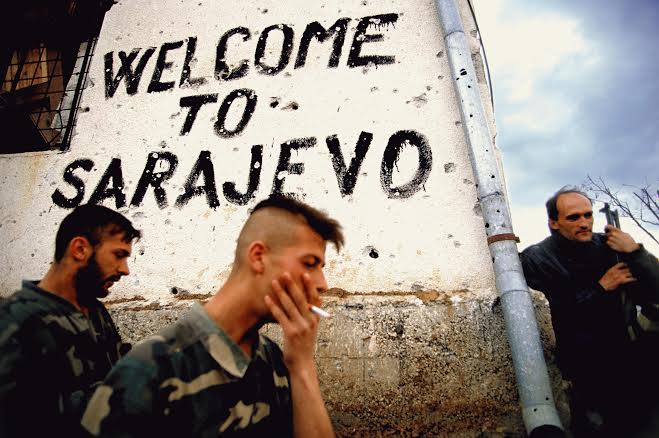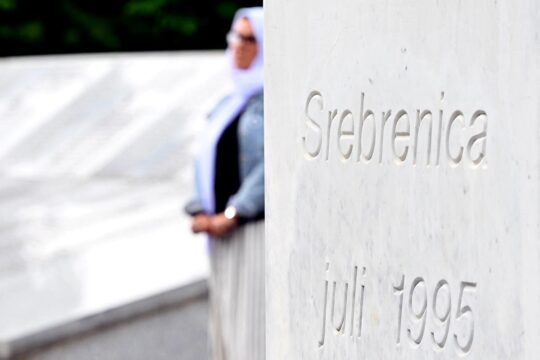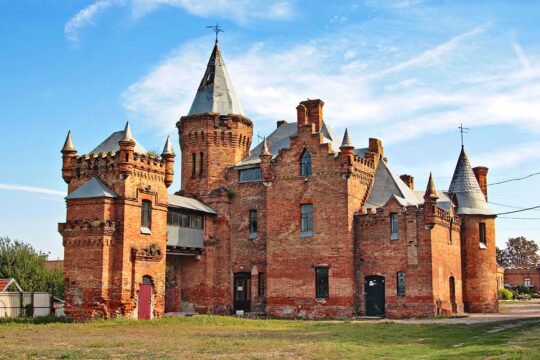In a packed room, young women in swimsuits parade for the Miss Sarajevo crown, as bombs rain down outside. Then, still with their radiant smiles, they hold up a banner saying “Don’t leave us to be killed” and throw flowers to the audience. Meanwhile adolescents fueled by lust for life break dance in a basement to forget fear, hunger, boredom and war. During short lulls in the fighting, rock and classical music concerts are held in what was once the magnificent library of Sarajevo before it was destroyed by shelling, although half the dome and part of the walls remain. Singers perform the musical Hair in the besieged city. These are just some of the surprising, poignant scenes from The Siege (Le siège), a documentary film by Patrick Chauvel and Rémy Ourdan which won best documentary of 2016 award from the International Festival of Audiovisual Programmes (FIPA).
Bosnia-Herzegovina’s capital was pounded by the Bosnian Serb forces of General Ratko Mladic – now on trial in The Hague – for four interminable years (1992 to 1995), leaving 11,541 people dead and many more injured. At the time, Rémy Ourdan was a young reporter who decided to stay in Sarajevo throughout the siege, working for various media (we also hear some of his radio reports of the time in the film) before joining French newspaper Le Monde. In the past four years he has got his hands on some stunning archives, often personal, which enabled this film to be made as a remembrance of the city’s cultural resistance.
A precious point of view
Patrick Chauvel and Rémy Ourdan’s film is remarkable because it shows not only images of war in its shocking and implacable cruelty, but also because it shows something rarer and more precious, which is the crucial role of culture as an integral part of resistance. This multi-ethnic city resisted with firearms, despite the imbalance of forces – kalachnikovs against heavy weapons – but also with humour, black jokes about the UN peacekeepers who were supposed to keep a peace that did not exist and self-mockery. The documentary also shows a surprising clip that remakes a Nike advert. In it we see an “athlete” warming up and then, thanks to the famous shoes, he is able to outrun the sniper fire.
In this environment of violence and destruction, is it still ethical to put on cultural shows and create art? An actor recounts how he asked the same question, thinking how absurd it was to put on a play in a besieged city whilst some of his friends were posted to the frontline defending the town physically. And a fighter answered: “What would we have to defend if you stopped performing?”
The people of Sarajevo did not choose war. They suffered it as they were surrounded and pounded for 1,425 days, the longest siege in modern history, refusing to be reduced to “caged animals”, as one of them said. Their resistance was against madness, despair, anxiety and isolation, the risk of falling apart after friends and family were killed and injured, neighbours fled or gone over to the enemy, not to mention the difficulty of finding drinking water or the cold that chilled them to the bone in the long winters. The documentary does not romanticize – the war was too terrible for that – or idealize. It also reminds us that mafiosi were the first to organize self-defence in some parts of the city, although some became war criminals who were finally arrested by their brothers in arms.
More than 20 years after the siege and the Bosnian war, this documentary takes us back to the Balkans, but also reminds us of Syria today. A documentary will no doubt show us one day how men, women and children in that country have for years been resisting the dehumanization processes inflicted on them, as the world has become used to their suffering.
*Le siège (The Siege) will be available on DVD in September. We should also note that Rémy Ourdan is the initiator of WARM (War, Art, Reporting and Memory), a Sarajevo-based association dedicated to war reporting, art and remembrance in conflict situations. WARM is organizing a cultural festival in Sarajevo in late June.






